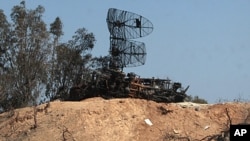Planes from a NATO-led international coalition are continuing to hit forces loyal to Libyan leader Colonel Moammar Gadhafi. The stated goal is to set up a no-fly zone to prevent Colonel Gadhafi from using air power against the Libyans who have risen up against him.
The United Nations Security Council resolution established the no-fly zone and also authorized member states to “take all necessary measures” to enforce the ban on flights.
Experts agree that the international coalition has achieved the U.N. goal of successfully imposing a no-fly zone over Libyan air space. Colonel Gadhafi’s air force and his air defense systems have been largely destroyed.
But the fighting between Gadhafi’s troops and rebel forces continues on the ground. Analysts are saying air power alone will not protect civilians and some are wondering whether the international coalition’s ultimate objective should be what is known as “regime change” - to oust Colonel Gadhafi from power.
The United States says the international coalition’s goal is not regime change, though President Barack Obama has stated on several occasions that “Ghadafi must go.”
The U.N. resolution does not refer to “regime change.” But Marc Ginsberg, former U.S. ambassador to Morocco, says the text is open-ended and broad.
“Different countries are interpreting it differently. The French and the British have a much more vigorous interpretation of the Security Council resolution than perhaps we do. It seems that we basically are doing precisely what I think other countries would be most wary of, which is taking a Security Council resolution and driving a truck through it,” Ginsberg said.
Ward Carroll, a former Navy radar specialist who flew aircraft patrolling earlier no-fly zones over Iraq and Bosnia, agrees. “The stated objectives are not about regime change and some are on the record as saying it’s not about regime change. And then others, like (French) President (Nicholas) Sarkozy, are saying look, it is about regime change,” Carroll stated. “And so those objectives are one and the same - stopping the killing of innocents equals Gadhafi has to go.”
During one of the air strikes on Libyan government forces, aircraft from the international coalition hit Gadhafi’s compound. He was not there.
Retired Air Force General Mike Dunn, who commanded airmen who patrolled no-fly zones, says the Libyan leader’s home is a legitimate target.
“Because it is a command and control target - if you remember, he is - just like President Obama is - he is the commander-in-chief. So the commander-in-chief issues orders, he is controlling the battle; it seems to me to be a legitimate target,” Dunn explains. “But the [U.S.] administration has made it very clear: we are not after a regime change.”
General Dunn says air power has its limits. “We know a no-fly zone is not going to bring down a dictator. It didn’t bring down Saddam Hussein in Iraq and we had it [no fly-zone] up from 1991 to 2003 - so we had it up for 12 years, both in the southern part of Iraq and in the northern part of Iraq. And Saddam Hussein was able to survive all that long time. So I think Gadhafi can survive this,” he said.
Former ambassador Marc Ginsberg agrees. “Because we have a political goal of getting rid of him, but a military goal of not necessarily going all the way to Tripoli, he could very well wind up still in power in a country that is largely, once again, divided the way it was before he took power when the monarchy was still in Libya. And so you can have a battle that is going on into a stalemate indefinitely,” Ginsberg said.
Experts also say that if Gadhafi remains in power it would be an extremely embarrassing situation for the international coalition engaged in fighting the Libyan leader - whether or not it’s ultimate goal is indeed regime change.
Is Libya Regime Change Ultimate Goal of International Coalition?




